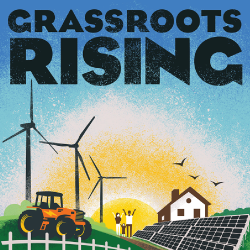In last week’s Organic Bytes, I wrote about the importance of constantly seeking out today’s positive solutions or best practices (food and farming, land use, energy, politics) if we wish to motivate and inspire grassroots allies or potential allies to take regenerative action in a time of profound crisis. It’s not enough to simply tell the truth in order to effect change, our truth-telling must connect up with people’s most passionate concerns.
A second rule for Regenerators as I lay out in my 2020 book Grassroots Rising, is to “connect the dots,” to understand and start off with the most pressing or important issues for an individual, constituency, or community and link these concerns to the action, strategy, or campaign we are trying to get them to understand and take action on.
As I point out in Chapter 2: “In addition to highlighting positive solutions, it is important to keep in mind that people’s situations and perspectives are different. We all have different passions or priorities. One size or one approach does not fit all. Therefore, we need to integrate our motivating or Regeneration messages with the specific issues and concerns that are most important to grassroots constituencies, and then lay out, in everyday language, a strategy that makes people understand that we can actually solve the problems they care about the most, while also solving a host of other pressing problems at the same time. Only by starting from where people are at, and then connecting the dots, can we capture the attention and imagination of a critical mass of the global grassroots and get them to start thinking about how they can participate in our new Regeneration Movement and alternative economy.
Objective and subjective conditions for change are different in every country in the world, and to some extent differ as well in the sub-regions and local communities of these 195 countries. Everyday people everywhere, including the most impoverished and vulnerable communities, have their burning issues as well as their secondary issues, and an inherent desire to alleviate and, if possible, solve the problems that are pressing down on them, in many cases threatening their very survival. In the activist community, major focus areas, in most cases reflecting the concerns of everyday people, include inflation and the high cost of living, freedom of choice and constitutional liberties, the climate crisis, environmental pollution, health, social justice, jobs and economic justice, peace, and democracy. Unfortunately, campaigners, both on the local and national/international levels, often work in isolation from other sectors, each in their own separate silos. This perpetuates tunnel vision in the body politic, parochial or sectarian attitudes, political polarization, and an overall weakness in global civil society.”
Read More From Chapter 2 of Grassroots Rising, “Rules for Regenerators”

